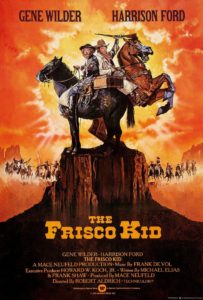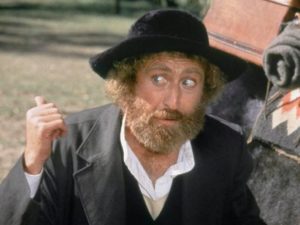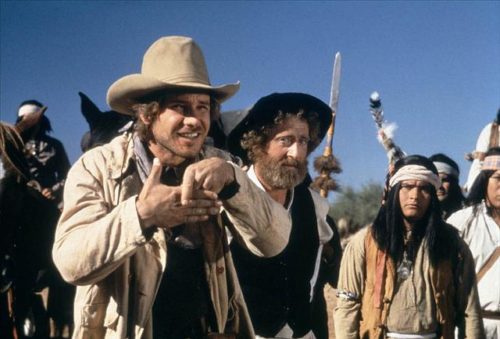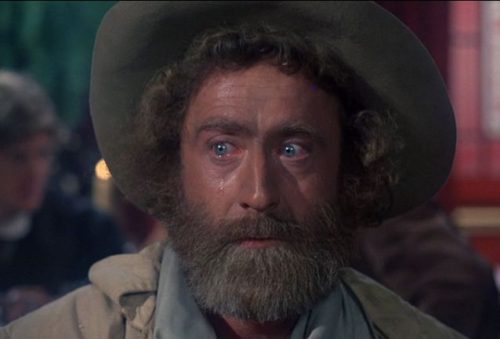 It’s not a well-remembered movie, The Frisco Kid (’79). It wasn’t much liked when it was released, and nobody’s paid much attention to it since. But when it is spoken of, it’s spoken of for one reason only: Gene Wilder.
It’s not a well-remembered movie, The Frisco Kid (’79). It wasn’t much liked when it was released, and nobody’s paid much attention to it since. But when it is spoken of, it’s spoken of for one reason only: Gene Wilder.
Wilder plays Rabbi Avram Belinski, last in his class of newly minted Rabbis in 1850 Poland (which by the way wasn’t a country at the time). He’s sent to San Francisco, there to lead a congregation and marry the daughter of an important Polish muckety-muck. Somehow or another he arrives in America in Philadelphia, and must make his way overland to San Francisco. Nutty adventures ensue.
It’s an utterly missable movie save for Wilder’s performance. He sports a wild beard, speaks in a sort of weirdly Polish/Jewish accent, and opens wide his kind, soulful eyes for us all to fall inside of. He exudes so much heart you want to love this stupid little movie, and maybe you kind of do because of him. As I said to the Mrs. halfway through, “It’s a fascinating movie, despite nothing that happens being in any way involving.” I’m not sure if she heard me or if she’d already fallen asleep by then.
It’s a performance right up there with Dr. Frankenstein. It’s that good. It’s just in a much, much crappier movie, so nobody bothers to watch it. There aren’t a lot of laughs in The Frisco Kid, but at least you can see where the laughs are supposed to go. It’s a great lesson in what happens if you have no idea what tone is or how to employ it. Or logic, for that matter. There are at least five different kinds of movies going on in here. They’re switched around on a scene by scene basis in a way you could only possibly hope to get away with in a 75 minute movie. The Frisco Kid is two full hours. It feels like three.
Harrison Ford turns up doing a dopey cowboy version of Han Solo. Watching him all I could think was, “In two years, this lucky dope will be starring in Raiders.” He’s not bad. But what the hell is he supposed to be doing? Winging it, mostly. Crazier still, apparently this script was floating around Hollywood for years with all sorts of people attached to it at one time or another, most notably John Wayne, who was to play the part that went to Ford. Same old story, though; he wanted too much money.
Try to imagine John Wayne playing against Gene Wilder. The mind boggles.
It’s the second to last film directed by Robert Aldrich (Kiss Me Deadly, The Dirty Dozen, Emperor of The North, Twilight’s Last Gleaming). I can’t say he displays much verve, and his sense of comedic timing is, oh, absent, let’s say. I don’t think I’ve seen a movie with more inexplicable transitions. You could shuffle around half the scenes and you’d never notice a difference.
But dear, departed Gene Wilder. I don’t know who else could have played this role with the heart he does. Even if they could have, they wouldn’t have. It’s a terrible script. Anyone else would have been desperate to wring some laughs out of it. Wilder treats it with utter seriousness. I mean of course he’s funny. He’s the only funny character in the movie. But he believes in rabbi Belinski. He turns him into a real person. So you end up believing in him too.




This film was an important part of my childhood; which is probably why I’ve been reluctant to re-watch it.
Yeah. I mean it might be interesting for you to get an adult perspective on the quality of Wilder’s performance. But in every other way, it’s the kind of movie you should definitely leave as a childhood memory, whatever that memory is.
Basically it was this: I could be a Jewish cowboy, just like Han Solo.
And look at you! It all came true! Amazing, the power of movies.
A surprisingly effective movie in terms of writing, at least for Wilder’s character. Michael Elias manages to input his Jewish upbringing in the Talmudic logic that Wilder’s character often employs in the various bizarre situations he finds himself in. It’s great for that alone to me, but does suffer as any sort of coherent experience.
Only with a traditional or Orthodox upbringing can one truly appreciate the comedy in Gene Wilder’s journey. Be it his furry with Harrison Ford for making him an accomplice to a Bank Robbery… Or Mr. Ping and Paco working on the railroad. Gene Wilder effectively portrayed in a comedic and tragic way “A Stranger in a Strange Land”. He is strong in his faith and has no issue with assimilation or acculturation despite his first experience in America is getting conned, and robbed of everything. His bond with Ford comes off as quite authentic and Ford playing a loner and even the few robberies he doesn’t kill anyone in the movie.
The scene with Native Americans as he is unknowingly getting loaded on peyote, and waking in his life where antisemitism had emanated most from in Europe the Catholic and Russian Orthodox Church. His ability to maintain his identity without alienating strangers but even leaving a positive impression on them e.g. Mr Ping and Paco express concern and don’t want him to go on as Mr Ping yells out “You going get lost crazy Jew Boy” (Mr Ping being from China in semi Manchuria dress telling Gene “You speak funny, you funny looking” also twisted with that here’s a very different sounding and looking Chinese Man Telling the Eastern European Jew.
It’s a warm family comedy that’s not intended to get hooked on historical details, be it Prussia instead of Poland or Czarist controlled Baltic areas is irrelevant, just as is weather barbed wire was around yet. These are nitpickings on a historical document not a comedy.
Judaism is a niche that Wilder felt comfortable with. Another comedian could pull off the basic concept of a Stranger in a Strange land by it being another foreigner with another mission.
I loved Young Frankenstein but that’s a spoof film not a journey film, and I love See no Evil hear no evil where a similar concept though not the primary focus is a blind man and deaf man struggling for survival without the conflict of identity because they’ll always be blind and deaf.